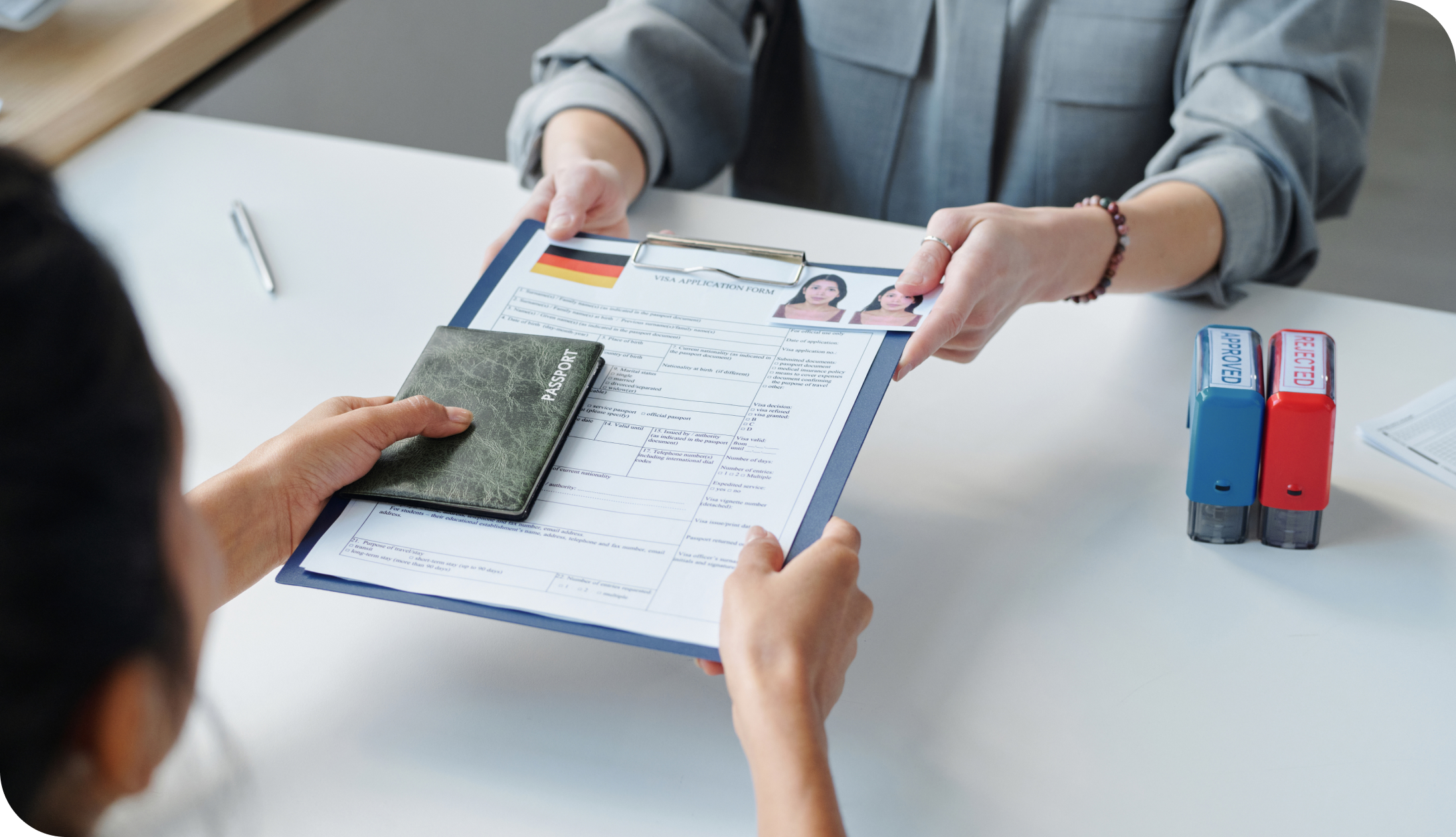
Planning to explore Germany’s dynamic cities, charmingly picturesque villages, or world-famous festivals? In Europe’s economic powerhouse, there is much to see and do! However, if you’re a non-EU/EEA national, you may need a Schengen short-stay visa (Type C) to visit Germany for tourism, business, or family reasons especially if your stay is under 90 days.
This guide shows you who exactly needs a visa, what documents to prepare, how to apply, and why Schengen-approved Travel Insurance from Gigasure is essential for a smooth process. With a bit of planning, you’ll be drinking authentic Bavarian beer and enjoying the dynamic culture of Germany in no time!
Who Needs a Visa for Germany?
- UK citizens do not need a visa for stays up to 90 days within 180 days.
- Non-visa-exempt nationals must apply before travel.
- The usual Schengen rules apply: max 90 days in any 180-day period, passport valid at least 3 months beyond your stay, issued within the last 10 years.
Types of German visas
- Short-stay (Type C) — tourism, business, family visits up to 90 days.
- Multiple-entry visas — valid for longer periods, allowing several entries.
- Long-stay (Type D) — for work, study, or family reunification over 90 days.
Document checklist for Germany Schengen visa
- Valid Passport: Less than 10 years old, valid +3 months
- Completed visa application: Signed and dated
- Two recent photos: 35 × 45 mm, white background
- Travel-medical insurance: Minimum €30,000 coverage for all Schengen countries, including Germany
- Proof of financial means: At least €65/day with hotel booking or €120/day without
- Proof of accommodation: Approx. €45 per day, or €720 total
- Itinerary & accommodation: Confirmed bookings or invitation letter
- UK residence permit: If not a UK citizen
- Additional documents: Depending on purpose of visit
How to Apply for a German Schengen visa: 6 steps
- Identify your visa type and collect documents.
- Create an account on the official visa application portal or via your visa application centre (VAC).
- Book your appointment at the nearest VAC or consulate.
- Attend your appointment for biometrics and submit your documents.
- Pay the visa fee and service charges.
- Track your application online; collect your passport when ready.
Apply between 180 and 15 days before travel. Processing typically takes 15–30 days.
Visa fees for Germany (as of June 2025)
Applicant: Adults (12+)
- Fee (EUR): €80
Applicant: Children (6–11)
- Fee (EUR): €40
Applicant: Children under 6
- Fee (EUR): Free
Additional service fees may apply at visa centres.
Financial requirements
- Germany recommends approx. €45 per day to cover your expenses.
- For a 10-day trip, that’s roughly €450 in accessible funds.
- Confirm exact amounts with the German consulate.
Where to Apply & Biometrics
- Visa Application Centres (VACs) in London, Manchester, and Edinburgh accept German Schengen visa applications.
- Biometrics are valid for 59 months and can be reused if taken since July 2021.
- Direct consulate applications are possible for certain visa categories.
Upcoming changes to Schengen travel
- EES (Entry/Exit System): Starts Oct 2025, digitising border control stamps.
- ETIAS: Expected in late 2026, mandatory electronic travel authorisation for visa-exempt travellers.
- UK citizens will need ETIAS to visit Schengen countries visa-free.
Note: Dates can change so it’s always a good idea to keep an eye out on the ETIAS website.
Insurance requirements for Germany Schengen visa
German authorities require travel medical insurance that:
- Covers at least €30,000 in emergency medical, hospitalisation, and repatriation expenses.
- Is valid throughout your stay and all transit days
Why Travellers Are Choosing Gigasure
- Multiple plan levels to suit your trip and budget.
- Unique customisation options so you can ensure your policy has you covered for what you need.
- Instant confirmation and visa-compliant certificates, easily accessible via our app.
- Full refund if your visa is refused.
Pro Tip
Common reasons for refusal include incomplete documents, insufficient funds, or lack of valid insurance. You can appeal within one month to the German consulate or reapply with corrected documents.
Useful Contacts You Might Need
- Visa Application Centres (VACs) - Appointments and tracking
- German Embassy London - Visa info and appeals
- ETIAS Travel Authorisation Info - Official ETIAS website for updates
Your Most Asked Questions
How do I get a Schengen visa for Germany?
To obtain a Schengen visa for Germany, you need to submit a complete application including a valid passport, proof of accommodation, a detailed travel itinerary, and evidence of sufficient funds. Crucially, you must also provide travel medical insurance with a minimum coverage of €30,000 that covers emergency medical treatment, hospitalisation, and repatriation for the entire duration of your stay and any transit days. Applications are typically submitted via the German consulate or an authorised visa centre, where you’ll provide biometrics and pay the applicable fees.
Do UK citizens need a Schengen visa to visit Germany?
Currently, UK citizens do not require a Schengen visa for short stays of up to 90 days within any 180-day period for tourism or business. However, post-Brexit, UK travellers will need to apply for ETIAS (European Travel Information and Authorisation System) from late 2026, which is a digital travel authorisation.
Is a Schengen visa valid for Germany only?
A Schengen visa issued by Germany allows you to travel freely within all 27 Schengen Area countries for the duration and purpose stated on the visa. This means you can enter Germany and move across other member countries such as France, Italy, and the Netherlands without additional visas, provided you respect the 90/180-day rule. However, the visa is generally issued by the country of your main destination or first point of entry, so ensure you apply at the correct consulate.
How long does it take to process a Germany Schengen visa?
Processing times for a Germany Schengen visa typically range from 15 to 30 calendar days after your application and biometrics submission. During peak travel seasons or exceptional circumstances, processing may take longer. To avoid stress, it’s advisable to submit your application as early as possible—no earlier than 6 months before your trip and no later than 15 calendar days before departure.
Can I travel elsewhere in Schengen with a Germany visa?
Yes, a Schengen visa issued by Germany grants you access to all Schengen member states. You can freely travel within the Schengen zone during your visa’s validity, allowing you to explore neighbouring countries without additional paperwork. Keep in mind the total length of stay across all Schengen countries combined cannot exceed 90 days within a 180-day period.
What happens if my Germany Schengen visa is refused?
If your visa application is refused, you will receive a formal letter explaining the reasons, such as incomplete documentation, insufficient proof of funds, or doubts about your travel intentions. You have the right to appeal the decision within a month, submitting additional evidence to the relevant consulate. Alternatively, you may reapply once the issues are addressed.
Ready to embark on your German adventure?
Whether you’re drawn by the timeless charm of Berlin’s vibrant streets, the fairy-tale castles of Bavaria, or the world-class art and culture scattered across the country, Germany promises experiences that linger long after your trip ends. From bustling Christmas markets to serene Rhine Valley cruises to the legendary Oktoberfest celebrations, your journey begins with the right paperwork and peace of mind.
With Gigasure’s Schengen-compliant Travel Insurance, securing your cover is effortless, fast, and tailored to your needs. This leaves you free to focus on planning the perfect itinerary. Instant confirmation, easy-to-understand plans, and a visa refusal refund guarantee mean you travel smart and stress-free!
Information accurate as of June 2025. Always confirm visa details with the German Consulate or official Schengen sources before applying.











